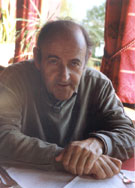Felix Werder (1922-2012) : Represented Artist
|
|
Random Audio Sample: Monograph : for piano by Felix Werder, from the CD Blue wrens |
- Browse works by Felix Werder
- Browse recordings available to purchase featuring music by Felix Werder
- Browse articles by and about Felix Werder
- Browse events featuring music by Felix Werder

Felix Werder was born in Berlin in 1922 but fled the increasingly difficult political situation in Nazi Germany in 1935. On arriving in Australia with his father in 1940, Werder was interned for four years as a political prisoner. During this time he produced a large number of his early compositions - many of his fellow internees were musicians and, once they had instruments to play upon, the lack of music led Werder to write fragments of the scores of Handel and Mozart from memory, later progressing to his own imitations of seventeenth- and eighteenth-century music.
Werder's German and Jewish heritage greatly impacted his music. His family had been a part of Schoenberg's musical circle, and, from the age of eight, Werder had acted as copyist for his father, formerly a cantor and liturgical composer at a leading Berlin synagogue. These circumstances gave Werder technique, and instilled in him a strong feeling of musical tradition. The music of the synagogue, first heard in these early years, was also a strong influence on his music, appearing in his use of the Hebraic modes (in early works), and in the melismatic treatment of speech rhythms.
Werder's early twelve-tone music gave way to a more improvisatory, collage-like style that often made virtuosic demands on its performers. From 1956, Werder was active as adult education class lecturer on music, and, from 1960 to 1977, as music critic for the Melbourne daily newspaper The Age, before moving into radio where he developed a series on contemporary music for the ABC together with Keith Humble.
Felix Werder wrote for a wide variety of musical media, including chamber music, orchestral and music theatre works, and received numerous commissions from organisations such as Deutsche Oper (1967), the ABC (1969), the Australian Opera (1969), the National Theatre (1975), the Victorian State Opera (1976), and the Berlin Festival (1987).
A significant figure in Australia's musical avant-garde, Werder went on composing until very recently, and his 90th birthday concert in February 2012 included several premieres. According to a composer colleague, Warren Burt, Werder had been refining his technique and 'getting closer to what one might term "pure music", a product of intense reflection and personal expression'.
In 2002, University of Melbourne awarded him the degree of Doctor of Music (honoris causa). He was also a recipient of the Order of Australia for services to music (1976). He received several awards for his work, including the Don Banks Music Award in 1986, the Stamitz Prize in 1988, and the Sir Zelman Cowan Medal in 1991.
A provocateur until the end of his life, Werder finished his own AMC biography by stating: '...a thing of beauty is a bore forever', and 'music is not as soporific for calming neurosis of a decadent bourgeois society'.
An extensive 2-part oral history interview with Felix Werder is available on the National Library of Australia website.
Felix Werder died in Melbourne, at the age of 90, on 3 May 2012.
Awards & Prizes
| Year | Award | Placing | Awarded for |
|---|---|---|---|
| 2004 | Classical Music Awards - Long-Term Contribution to the Advancement of Australian Music | Winner | |
| 1986 | Don Banks Music Award | Recipient |
Selected Commissions
| Work | Commission Details | |
|---|---|---|
|
|
Set 2 : oboe and guitar duos | Commissioned by Studio Neu Musik, Berlin |
|
|
Paul Klee suite : soprano with ensemble | Commissioned by Goethe Institute. |
|
|
Gryphiusad, op. 319 (baritone with orchestra) (1996) | Commissioned by the Silesian Music Society, and written for the bass-baritone Peter Ziethen |
|
|
Belsazer, op. 260 : soprano with ensemble (1988) | Commissioned by the Dortmund School of Music |
|
|
Tenisax : for tenor saxophone and piano (1987) | Commissioned by Peter Clinch. |
|
|
Saxophone quartet & percussion, op. 250 : chamber ensemble (1987) | Commissioned by the Fellowship of German Artists |